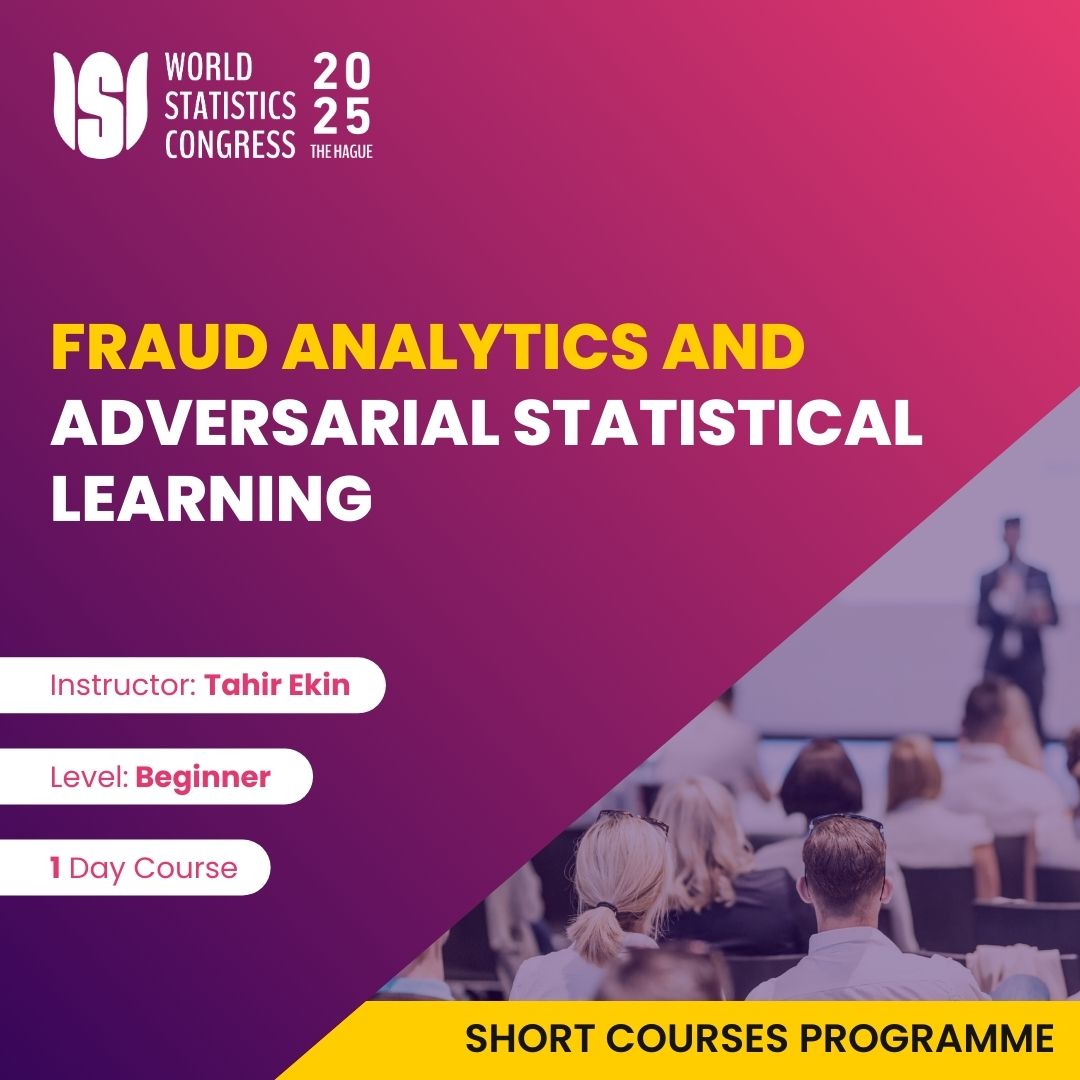
For more details on registrations and submissions for the Fraud Analytics and Adversarial Statistical Learning, please first login to your account. If you do not have an account then you can create one below:
Fraud has been around since the early days of commerce, continuously evolving and adapting to changing times. The fraudulent cases are seen in a wide range of domains such as finance, credit card, telecommunications, insurance and health care. Examples include but not limited to the instances in financial stimulus, unemployment eligibility and health care procurement. For instance, in health care, overpayments are estimated to correspond up to ten percent of total expenditures. This short course presents the use of analytical methods for fraud assessment. Fraud data and its types will be introduced with some examples and pre-processing techniques. Next, the course will cover the use of visualization and unsupervised methods (outlier detection, clustering, topic models) to describe data and reveal hidden relationships. Whereas supervised methods such as classification and regression can be used with labeled data sets for prediction purposes. These methods will be discussed using examples from finance and health care industries. The course will conclude with an introduction to adversarial statistical and machine learning methods.

Tahir Ekin is the Fields Chair in Business Analytics and a Professor of Analytics at McCoy College of Business, Texas State University.
He also serves as the founding director of TXST Center for Analytics and Data Science. His teaching experience include the areas of statistics, optimization, data mining and analytics. His areas of expertise include health care fraud analytics and decision modeling under uncertainty. His research has been funded by National Science Foundation, Air Force Scientific Office of Research, Texas Health and Human Services, among others. In addition to dozens of scholarly articles, Dr. Ekin authored a book, “Statistics and Health Care Fraud: How to Save Billions.” Dr. Ekin holds a Ph.D. in Decision Sciences from The George Washington University, and a B.S. in Industrial Engineering from Bilkent University. He has given trainings on fraud analytics in workshops sponsored by European Health Care Fraud and Corruption Network, ISI and INFORMS. He is an elected member of International Statistical Institute and his previous roles include two term Vice President of the International Society of Business and Industrial Statisticians, and a two-year appointment as a member of Texas State University President’s Cabinet.
Session 1: Introduction to fraud and data: Statistical fraud assessment and R, Importance of fraud detection, Definition and types of fraud with examples, Fraud data and pre-processing methods
Session 2: Descriptive Fraud Analytics: Visualization, Descriptive Statistical Methods, Outlier detection, Clustering, Topic models
Session 3: Predictive Fraud Analytics: Classification, Regression; Model Evaluation
Session 4: Introduction to adversarial statistical and machine learning and its relevance to fraud detection
Session 5: Overview: Future directions and challenges with fraud detection and adversarial statistical learning
Identify various types of fraud and data
Apply data pre-processing methods for fraud cases
Evaluate the use of statistical methods for fraud detection
Identify emerging adversarial statistical and machine learning methods
Describe potential future directions and challenges with fraud detection and adversarial statistical learning
Researchers in financial service companies, banks, insurance companies, government institutions, health care institutions, and consulting firms as well as fraud data analysts/scientists; consultants working in fraud detection. This course is also expected to be of interest to early career statisticians that can gain insights about how different data mining/statistical methods are applied in these emerging crucial subject domains.
Introductory knowledge of data types and statistical and machine learning methods will be helpful, as the focus will be on fraud applications.
For more details on registrations and submissions for the Fraud Analytics and Adversarial Statistical Learning, please first login to your account. If you do not have an account then you can create one below:
We have placed cookies on your device to help make this website better.
You can change your cookie settings in your web browser. Otherwise, we’ll assume you’re OK to continue.
Some of the cookies we use are essential for the site to work.
We also use some non-essential cookies to collect information for making reports and to help us improve the site. The cookies collect information in an anonymous form.
To control third party cookies, you can also adjust your browser settings.
Do Not Accept Third Party Cookies